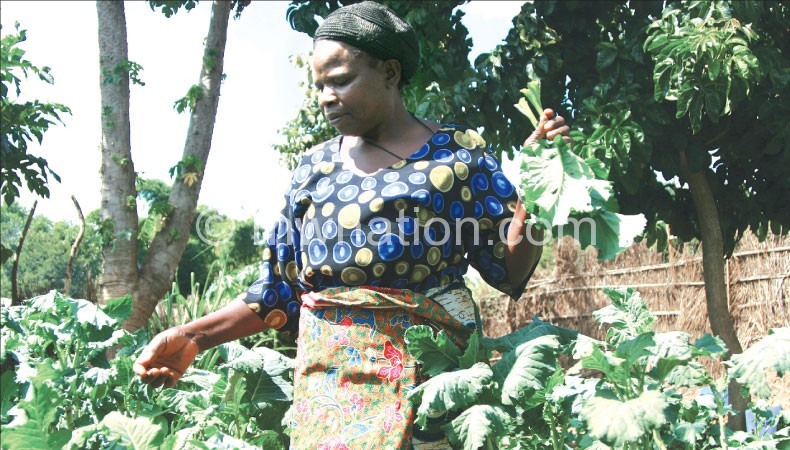United in tackling Malawi’s nutrition needs

Food, one of the basic needs of humankind, seems to be a scarce commodity in many households in Africa. The state of malnutrition, especially in some poor rural communities, usually affects children’s health, resulting in conditions such as stunted growth, goitre, blindness and kwashiorkor.
This, according to the World Health Organisation (WHO), is responsible for about 3.5 million child deaths every year in Africa, a situation which is partly attributed to low vegetable and fruit intake.
Sadly enough, global measures to reduce the menacing effects of this phenomenon on the continent appear to be towards the introduction of food supplements which are usually expensive and inaccessible to many poor households. It has, therefore, become necessary to explore alternatives that offer poor households cheap sources of essential micro-nutrients.
In Malawi, the picture is quite disturbing. Children who are stunted, underweight and wasting are common in the country.
In 2012, government placed nutrition high on the agenda with the Department of Nutrition and HIV and Aids (DNHA) in the office of President and Cabinet (OPC) when it launched the Scaling-Up Nutrition (SUN) initiative and 1 000 special days aimed at empowering individuals and organisations with technical, advocacy and implementation skills that will translate into improved knowledge, action and practice during the first 1 000 days of a child’s life.
However, although civil society organisations (CSOs) have actively been involved in the implementation of nutrition interventions, their efforts have been fragmented and uncoordinated leading to inconsistent messaging to foster the intake of best practices in nutrition. The CSO engagement has been more on implementation level with little focus on advocacy for increased resource allocation for nutrition.
According to the 2010 Malawi Demographic Health Survey (MDHS), the national prevalence of child stunting is at 49.1 percent while that of underweight children averages 17.7 percent, with 4.6 percent being the prevalence of wasting.
The information is said to have been collected in February 2013 from areas where World Vision operates in the country. However, there are indicators that things have changed for the better now; according the organisation’s cluster manager for Mchinji, Lamech Chimphero.
But for a change, in a bid to effectively support existing commitments by government to achieving SUN objectives, the country established a CSO Nutrition Alliance (Csona) to better organise, coordinate and share best practices as well as bring together efforts to leverage resources and maximise impact in nutrition at all levels.
Membership of the Csona includes representatives from the media, religious bodies, academic institutions and NGOs which implement nutrition, health and food security programmes such as Concern Worldwide, Clinton Health Access Initiative (Chai), World Vision International (WVI), CARE International, Africare, VSO International, Feed the Children, Wellness for Agriculture and Livelihood Advancement (Wala) and Support for Service Delivery Integration (SSDI).
Csona partnership support officer Virginia Mzunzu, who also represents Concern Worldwide Malawi in the alliance, said the coalition will facilitate CSOs to take a leading role in influencing and supporting national efforts through meaningful dialogue, advocacy with stakeholders such as government, donors and the private sector and thus contribute to a successful roll-out of the national nutrition interventions.
Speaking recently during commemorations of the Global Day of Action Towards Nutrition in Mchinji, Chimphero, who is the chairperson for the district’s Csona said it was time to move away from rhetoric to action in building a healthier Malawi. Mchinji has the country’s highest malnutrition levels, with a 53 percent prevalence rate.
“We have already started, as an alliance. Our focus is to empower households not only to be food secure but to also consider the nutritional value of their food,” Chimphero said.
He added that they are teaching their beneficiary households hygiene practices, food preparation, food diversification, family planning and that they should seek medical attention when they fall sick.
He said the alliance is also promoting livestock production and backyard vegetable gardens.
Behind such a robust move to address the country’s malnutrition are extension workers which members of the network deployed in their respective impact areas across the country.
“We want people to combat the deficiency by means that are easily accessible to them. The fight against malnutrition only becomes expensive with the knowledge gap existing among the people,” said Chimphero.
The United Nations University Institute for Natural Resources in Africa (UNU-INRA) recently conducted research whose findings reveal that some traditional plant species such as leaves of baobab tree, locust bean tree and black plum tree contain high levels of fibre, calcium, zinc and magnesium which are useful in tackling malnutrition, particularly among poor populations in Africa.
One of the country’s nutritionists Christine Selemani says the reports show the need for people to consume these traditional vegetables and fruits that could help prevent malnutrition in African communities.
“There is need for advocacy on these underutilised plants in our communities in the fight against malnutrition and hunger. It is also important that health institutions and other stakeholders incorporate the use of these locally available plants into policies as an alternative nutritional supplement for poor and food insecure households,” she said.
However, principal secretary in the Department of Nutrition and HIV and Aids Edith Mkawa suggested the country goes a step ahead in addressing its nutritional needs.
“We need to bring homecraft workers back in our communities. Even in urban areas, food preparation leaves a lot to be desired. Mostly, people are living on junk food which is not healthy.”
Mkawa also said in an interview that talks are underway to engage the Ministry of Gender, Child and Social Welfare to help with the homecraft aspect.
She explained: “The homecraft workers were deployed under the Ministry of Gender before they vanished. We need to resuscitate this community service which is crucial if we are to have a healthy nation. This will enhance the country’s socio-economic development.”




